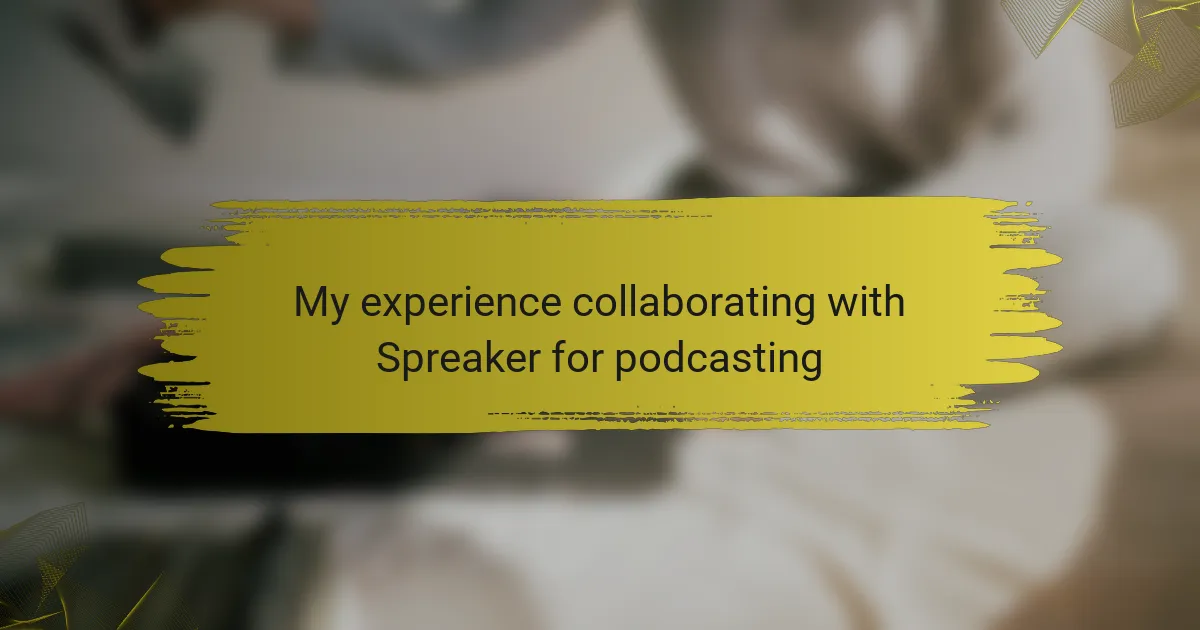Key takeaways
- Independent radio media fosters authenticity and diverse voices, supported by listener donations rather than corporate funding.
- Podcasting democratizes content creation, encouraging personal storytelling and community engagement.
- Collaborating with platforms like Spreaker enhances reach, provides valuable analytics, and builds credibility for creators.
- Challenges such as platform navigation and scheduling can lead to personal growth and improved podcasting skills.
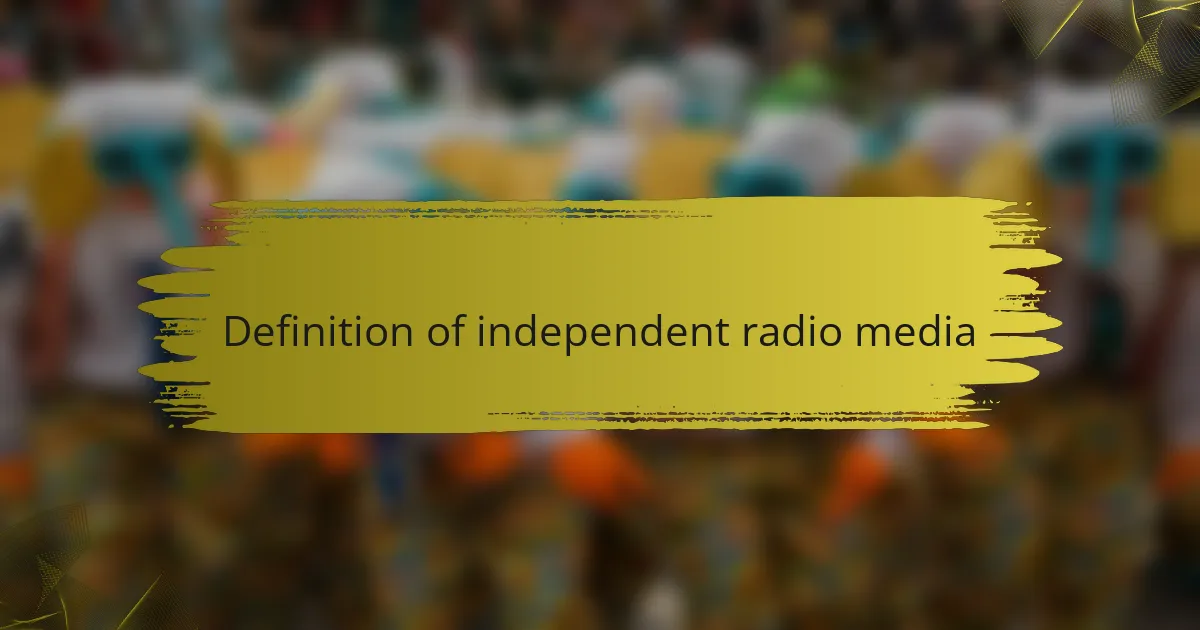
Definition of independent radio media
Independent radio media refers to broadcasting platforms that operate without corporate backing or interference. This independence allows creators to express diverse viewpoints, catering to niche audiences that mainstream media might overlook. I’ve always found independent radio to be a powerful space for authentic storytelling and community connection, where passion fuels creativity.
One of my favorite aspects of independent radio is the freedom it provides to explore unconventional topics. I remember tuning in to a local independent station and discovering an array of voices that challenged my perspectives, sparking thoughts that lingered long after the broadcasts ended. It’s in these stations that you often find genuine connection and engagement, making the listener feel truly part of something special.
In contrast with mainstream platforms, independent radio typically relies on listener support and donations rather than advertising revenue. This model encourages authenticity and helps to foster a loyal listener base. It’s heartening to see how many creators are willing to share their stories, even when faced with challenges—It speaks volumes about the importance of voice and expression in our media landscape.
“`html
| Independent Radio Media | Mainstream Radio |
|---|---|
| Operates without corporate influence | Often relies on corporate funding |
| Focuses on niche topics and diverse voices | Tends to adhere to popular trends |
| Supported by listener donations and community engagement | Primarily funded through advertisement revenue |
“`
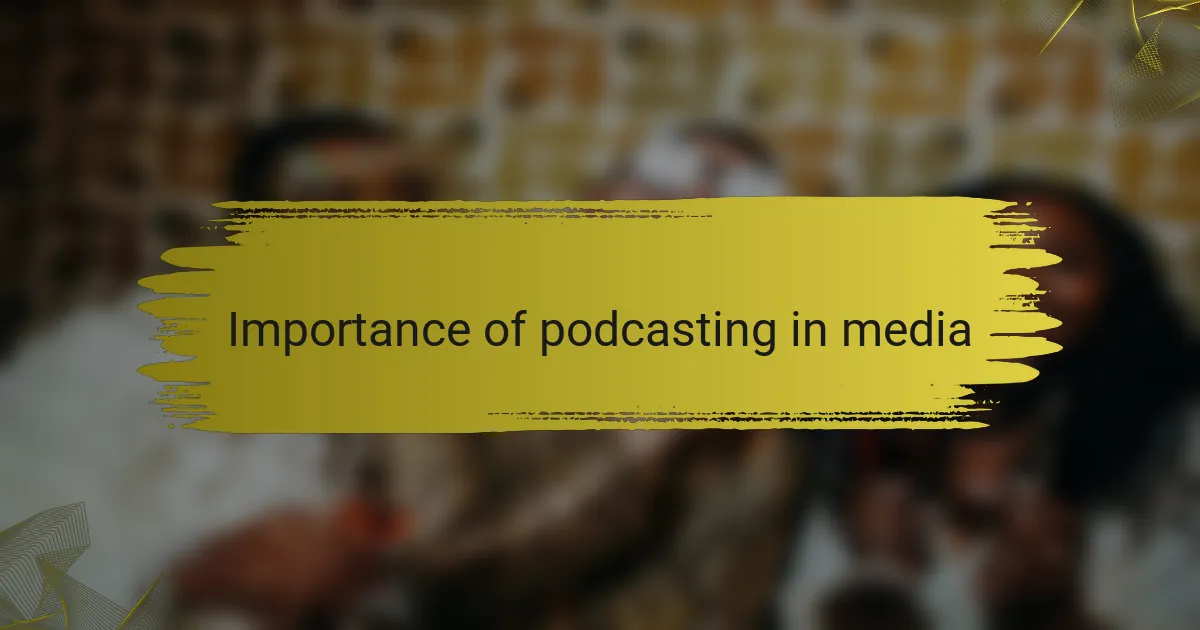
Importance of podcasting in media
Podcasting has become a vital component of modern media, amplifying voices that often go unheard. I often find myself lost in the world of podcasts, marveling at how they provide an intimate space for storytelling. Listening to someone share their personal journey feels remarkably personal, almost as if we’re having a conversation over coffee. Isn’t it fascinating how a simple audio format can connect us in such profound ways?
The accessibility of podcasting has democratized content creation, allowing anyone with a story to tell to step into the spotlight. I once collaborated with a podcaster who started with nothing but a microphone, yet their passion and authenticity resonated deeply with listeners. It’s proof that regardless of background, everyone has the potential to contribute meaningfully to our media landscape. The diverse perspectives offered through podcasting enrich our understanding of the world around us.
Moreover, podcasting fosters community in ways traditional media often cannot. I remember attending live podcast events where I met fellow fans—people who had been in my ears but felt like friends. There’s a unique bond created through shared experiences and stories, making audiences feel invested in each other’s lives. How often do we have that kind of connection with mainstream media? It’s this sense of belonging that underscores the importance of podcasting in today’s media ecosystem.
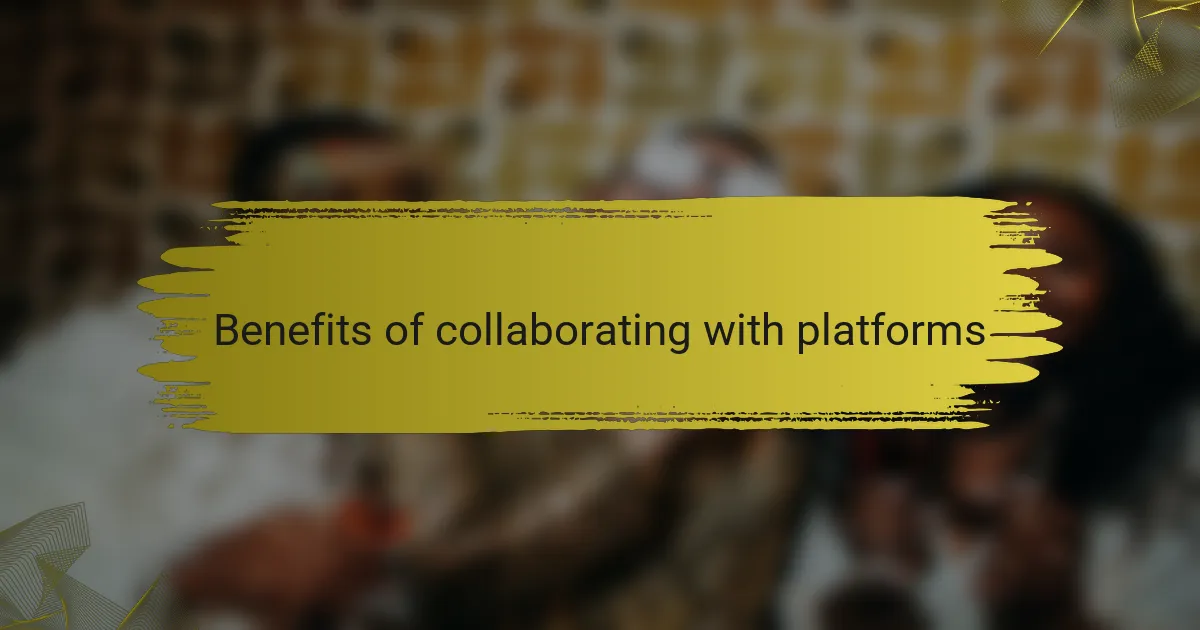
Benefits of collaborating with platforms
When collaborating with platforms like Spreaker, one of the most notable benefits is the expanded reach it can provide. I remember when I first started podcasting; my audience was limited to a small group of friends and family. After teaming up with Spreaker, my podcast connected with listeners around the globe, and it’s exhilarating to see how a shared story can resonate far beyond local boundaries. Isn’t it thrilling to think that your voice might touch someone halfway across the world?
Additionally, these platforms often offer valuable tools and analytics that help creators refine their craft. I still recall the moment I discovered the insights Spreaker provided about my audience’s listening habits. It was eye-opening! Knowing who listens, when they tune in, and what segments they enjoy most allows me to tailor my content more effectively. This type of feedback is crucial for growth and development as a podcaster.
Moreover, collaborating with established platforms lends credibility to your voice. I’ve found that being associated with a reputable platform enhances trust with listeners, making them more likely to engage with my content. It feels reassuring to be part of a community that values quality and authenticity, and it inspires me to continually strive for excellence in my podcasting journey. Have you ever felt more confident when backed by a supportive network? It certainly makes a difference!
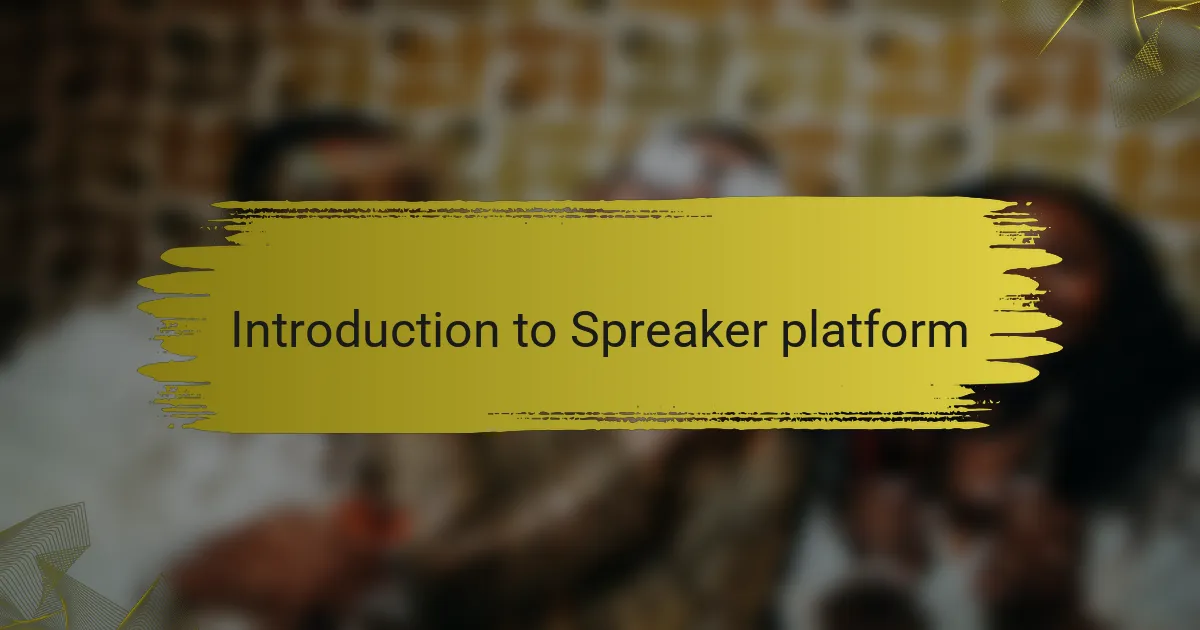
Introduction to Spreaker platform
When I first encountered the Spreaker platform, I was immediately impressed by its user-friendly interface. As someone who values simplicity, I found navigating through the platform to be a breeze, which allowed me to focus more on content creation rather than getting bogged down by technical complications. The features offered are designed for both beginners and seasoned podcasters alike, making it a versatile choice for anyone looking to venture into podcasting.
One of the aspects I appreciate the most is the extensive set of tools that Spreaker provides, which I’ve found invaluable in my own podcasting journey. Here are some highlights that stood out to me:
- Multi-Platform Distribution: Reach audiences on various platforms easily.
- Live Broadcasting: Engage listeners in real time with live shows.
- Monetization Options: Utilize advertising and subscription models to generate income.
- Analytics Dashboard: Gain insights into listener demographics and episode performance.
- Ease of Use: Intuitive design that simplifies the recording and publishing process.
These features have not only empowered me but transformed how I approach my podcasting endeavors.
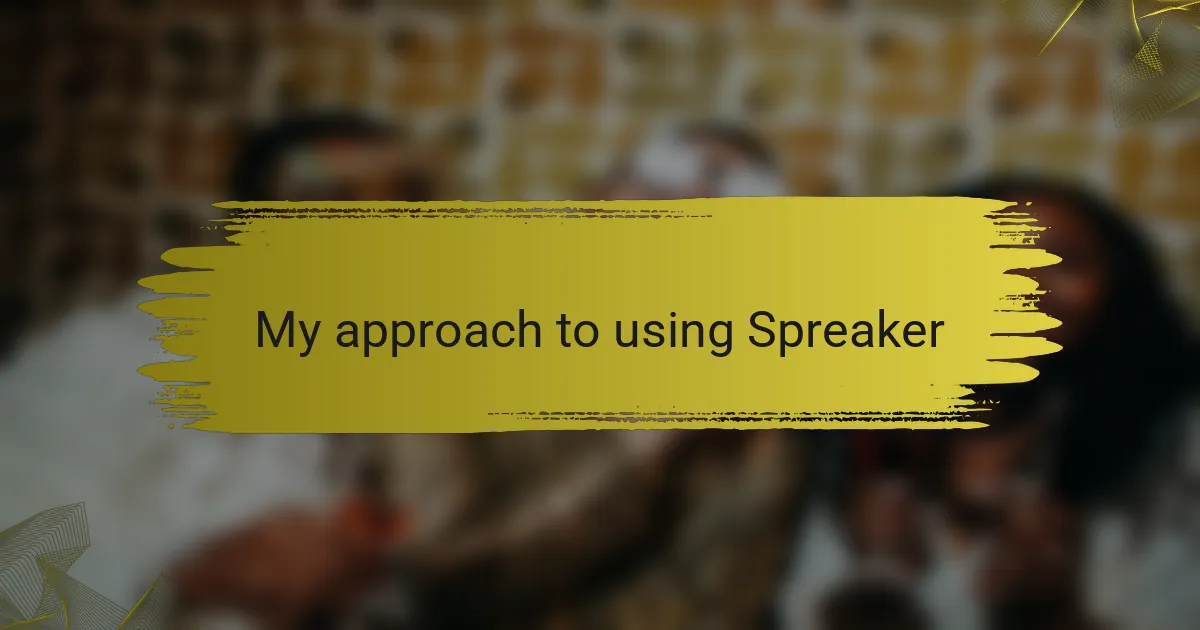
My approach to using Spreaker
When I first started using Spreaker, my mindset was all about exploration and learning. I remember feeling a mix of excitement and nervousness, knowing I had a wealth of ideas but not a clear path forward. As I familiarized myself with the platform, I quickly realized its potential to streamline my process. The straightforward controls were a breath of fresh air; I could focus on telling my stories rather than wrestling with complicated software.
One of the most significant shifts in my approach came from embracing Spreaker’s analytics. Initially, I had no clue who was tuning in or what they enjoyed most about my episodes. However, when I began to delve into the data, it was like turning on a light in a dim room. I vividly recall the moment I discovered that listeners particularly engaged with my storytelling episodes. This insight not only shaped my content but rekindled my passion, reinforcing the idea that my stories matter to others.
I also found the live broadcasting feature to be a game changer. Have you ever shared a thought in real time and felt the immediate energy from your audience? That was a revelation for me. It created an engaging atmosphere where listeners could interact, ask questions, and share their reactions as I spoke. This sense of community transformed my podcasting journey, making it feel less like a solitary endeavor and more like a shared experience. It’s moments like these that remind me of why I love podcasting in the first place.
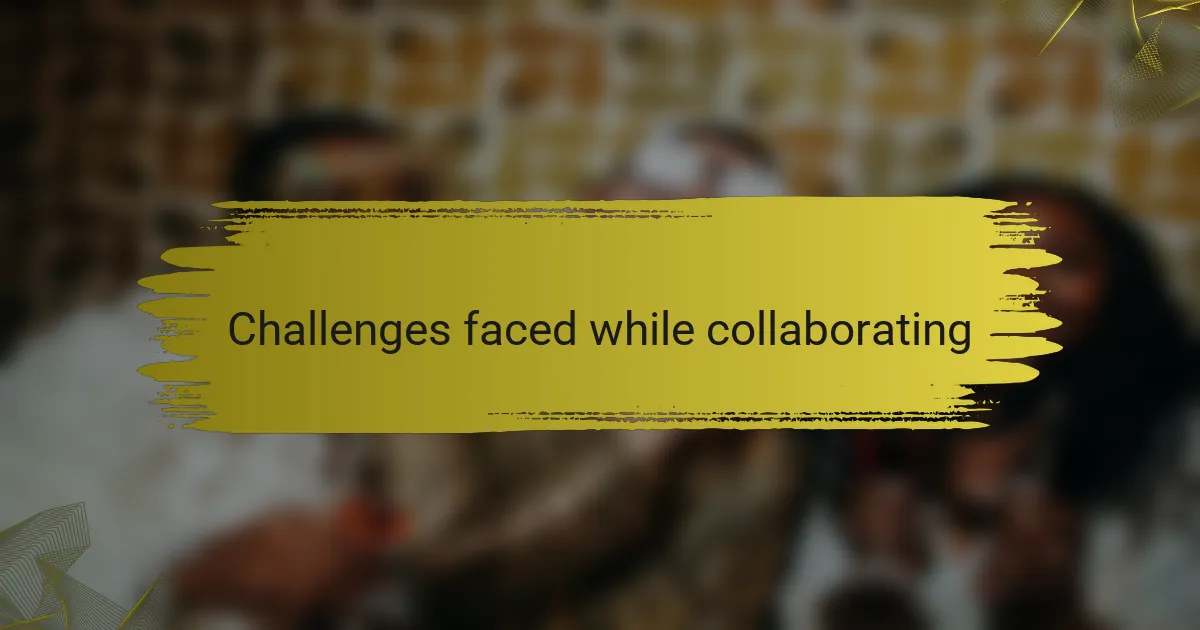
Challenges faced while collaborating
Collaborating with Spreaker presented a few challenges that were both surprising and educational. I remember the initial adjustment to their platform; it seemed a bit overwhelming with all the features available. As I navigated through the interface, I realized that while it offered great tools for podcasting, it took some time to figure out how to maximize them effectively.
One particular challenge was coordinating recording schedules with guests who were in different time zones. It could be quite frustrating at times, especially when someone would forget about daylight saving changes! However, these experiences taught me the value of being flexible and patient, which ultimately strengthened the relationships I built throughout the project.
In terms of technical issues, I faced some minor audio quality hiccups during recordings. It made me understand how crucial sound engineering is in podcasting. Despite these hurdles, the learning curve was rewarding, making each session a chance to improve my skills and enhance the overall podcasting experience.
| Challenge | Insight |
|---|---|
| Platform Navigation | Took time to master features |
| Scheduling Conflicts | Importance of flexibility |
| Audio Quality Issues | Need for sound engineering |
